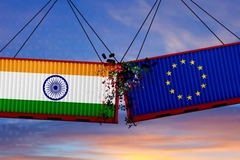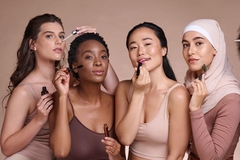Face full of fruit: Circular cosmetics industry banks on upcycled food byproducts

26 Jan 2023 --- Upcycled food-grade ingredients such as coffee, tea, olives and a variety of fruit have transitioned boldly into the mainstream as cosmetic, beauty and personal care companies embrace the idea of circular production. Coffee, in particular, is fast becoming a champion in the space as its byproducts can be used in an array of beauty products with photo-protecting, anti-aging and lipolytic action properties, according to a study published in MDPI journal.
“From a planet perspective, upcycling has to be the future of beauty, but also, from a brand perspective, it should be,” Anna Brightman, co-founder of UpCircle Beauty, tells PersonalCareInsights.
“Skincare is a crowded market,” she underscores. “Many skincare brands can claim to be vegan, natural, handmade, organic and cruelty-free – so can we. To stand out, you must go a step further; that’s why we create waste-fighting formulations.”

“At UpCircle, we believe we need to move to a circular rather than a linear approach.”
Upcycling is the beauty industry’s response to curbing its reliance on sulfates and parabens.
Meanwhile, according to the World Wildlife Fund for Nature, roughly one billion metric tons of food is wasted worldwide annually. “We’re changing perceptions on what is considered waste by getting people to use it on their face,” Brightman explains.
“Our rapidly growing customer base proves perceptions are changing,” remarks Brightman.
“People often believe that a brand’s focus on environmental concerns means that they’re less focused on skincare performance and efficacy. Skincare products can be both good for the environment and good for your skin.”
Peeling back the layersUpcircle’s face mask is made with the fine powder of discarded olive stones and can be used to minimize pores and cleanse and refresh the skin (Credit: Upcircle).
According to Innova Market Insights, beauty and personal care launches tracked with natural and organic claims grew by 9% between July 2017 and June 2022. Europe led the way at 61%, followed by Asia at 17%. Skincare was the top market category with natural and organic claims. These figures show that upcycling can reach a sizable market.
UpCircle upcycles 20 different by-product ingredients, including coffee, tea, argan, juice, date and olive, which are sold in 40 countries.
“We collect over 100 kg of coffee a day and can make 42,000 face scrubs per month with the quantity we are currently collecting. We’re partnered with over 100 independent coffee shops across London that we collect the used coffee from and we’ve rescued 400 metric tons of coffee so far,” Brightman says.
“Every repurposed ingredient that we work with has been taken from another industry. This means that it needs to be processed in one way or another in order that it’s appropriate for use in skincare,” Brightman explains.
Another company that upcycles coffee is Kaffe Bueno, which utilizes coffee by-products such as spent coffee grounds to produce ingredients for personal care and nutraceuticals, among others.
“Our consumption affects the world, and our beloved coffee is no exception. It has a high price, which is often paid by the climate, nature and the many millions of workers and small farmers who grow our coffee for too low a wage,” says Nanna Callisen Bang, director of Ethical Trade Denmark.
Consumer movement
Buyers are increasingly becoming conscious with their purchases and look to brands to help further their stances.
However, Brightman has witnessed firsthand how difficult it is to get people to embrace upcycled ingredients in skincare. “But if we can provide competitively priced, high-performing products from upcycled ingredients, then we are demonstrating that the beauty industry can become much less wasteful – an innovative approach and a fresh perspective.”
“All of this effort is futile if the industry is not willing to open its arms to what would be waste ingredients. Based on our rapid growth, it looks like consumers are ready for a forward-thinking ethos like ours,” she says.
According to sustainable tech agency Provenance’s Skin Deep Beauty report, 41% of beauty shoppers think waste is an important consideration, while a quarter are actively buying items with less environmental impact.
“One-third of all food in the UK is wasted, and nearly one-third of people have a skincare routine. That’s one huge opportunity to save the planet through skincare – we want more brands to join,” Brightman urges.
Utilizing the entire bean The by-products from coffee contain phenolic compounds which makes it ideal as a cosmetic ingredient.
The by-products from coffee contain phenolic compounds which makes it ideal as a cosmetic ingredient.
Coffee by-products, such as coffee beans, possess bioactive compounds that can provide functional properties in cosmetic formulations. Coffee silverskin and spent coffee grounds are high-volume by-products of the coffee industry.
Next to UpCircle, Mibelle Biochemistry is another industry player previously highlighted on PersonalCareInsights, which is also tapping into this circular resource. Last April, the cosmetic ingredients supplier introduced its upcycled coffee silverskin ingredient, SLVR’Coffee, for moisturization.
Further delving into coffee, a study published in MDPI journal explored the benefits of phenolic compounds, such as chlorogenic acids and caffeine, that make the hot beverage ingredient viable as a cosmetic ingredient.
Caffeine is coveted for its photo-protector and anti-aging properties and lipolytic action in cellulitis and hair regrowth. Chlorogenic acids are potent antioxidants and exhibit anti-aging and photo-protector abilities.
Noting these qualities, caffeine can be incorporated into protective products, like sunscreens.
Repurposing residual fruit waters
The ingredients that UpCircle upcycles are organically grown and harvested seasonally in climates suited to the crops. For example, its mandarin fruits are grown in Seville, Spain.
Brightman continues: “We repurpose residual fruit waters left over after the creation of juice concentrates. Water is often the first ingredient in skincare. It, therefore, plays an important role in the sustainability of the overall formulation and is a great target ingredient to replace with a more sustainable alternative.”
The company’s products are made using simple methods that include melting, blending, whisking and pouring by hand. This allows the producers to monitor the process closely and will enable UpCircle to reduce its energy consumption.
The upcycled extracts, waters and powders are obtained without flash distillation or microwaves.
However, being a disruptor brand means the company is one of the first to work with these types of ingredients at scale. “We’ve had to figure out our supply chain, manufacturing and general operational hurdles ourselves,” concedes Brightman.
The upcycled beauty movement will continue to gain traction alongside the buoyant clean-label ingredients trend that is expanding across regions. In recent notable highlights, Dewy Lab, “China’s first clean beauty brand,” has completed three rounds of funding in one year since its launch, lauded as a testament to the rise and growth of clean beauty in China.
By Inga de Jong













